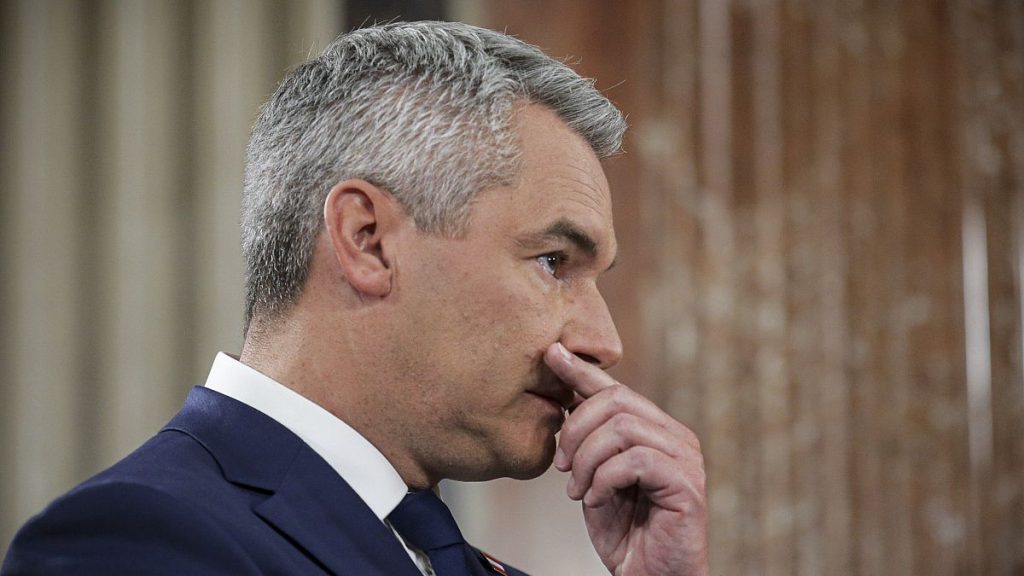The Austrian political landscape is embroiled in a deepening crisis following the collapse of coalition talks, leaving the nation teetering on the brink of fresh elections. Chancellor Karl Nehammer, leader of the conservative People’s Party (ÖVP), announced his impending resignation after negotiations with the Social Democrats (SPÖ) and the liberal Neos party failed to produce a viable governing coalition. The right-wing Freedom Party (FPÖ), led by Herbert Kickl, emerged victorious in September’s election, garnering 29.2% of the vote. However, Kickl’s controversial past and hardline stance have made him a persona non grata amongst other major parties, effectively blocking the FPÖ from forming a government despite their electoral triumph. This unprecedented situation has forced the ÖVP and SPÖ, traditional rivals, into an uneasy alliance, seeking the support of a smaller party to secure a parliamentary majority. Their attempts to forge a three-way coalition with the Neos ultimately crumbled, plunging Austria into further political uncertainty.
Nehammer attributed the breakdown of talks to “destructive forces” within the SPÖ, citing disagreements over economic policy and taxation as insurmountable obstacles. He accused the Social Democrats of pushing for measures that would undermine Austria’s economic competitiveness and burden businesses with new taxes. Conversely, SPÖ leader Andreas Babler expressed his disappointment with the ÖVP’s decision to abandon negotiations, emphasizing the urgent need to address the “record deficit” inherited from the previous government. He suggested that differences in fiscal policy were the primary sticking point, with the SPÖ advocating for a more interventionist approach while the ÖVP favored a more conservative fiscal stance. The Neos, led by Beate Meinl-Reisinger, also withdrew from the talks, citing the lack of progress on “fundamental reforms” as the reason for their departure. This multifaceted disagreement highlighted the deep ideological divides within Austrian politics and the difficulty of bridging these gaps to form a stable government.
The failure of coalition talks has laid bare the stark reality of Austrian politics: the FPÖ’s electoral victory, while undeniable, remains untranslatable into actual power due to the widespread reluctance of other parties to collaborate with Kickl. This has created a political impasse, forcing the traditional powerhouses, the ÖVP and SPÖ, to attempt an unlikely and ultimately unsuccessful partnership. The Neos, initially seen as a potential kingmaker, also failed to bridge the divide, leaving Austria without a clear path forward. This situation underscores the complex interplay between electoral outcomes and the practicalities of forming a functioning government, especially in a multi-party system where ideological differences can be stark.
Kickl, meanwhile, seized the opportunity to criticize the other party leaders for their “Kickl prevention strategy,” accusing them of wasting valuable time and creating further instability. He argued that the months spent in fruitless negotiations could have been better used to address the pressing economic challenges facing Austria. With the prospect of fresh elections looming, the FPÖ appears poised to capitalize on the prevailing political instability and potentially further solidify their position as the leading political force in the country. Recent polls suggest a surge in support for the FPÖ since the September elections, indicating growing public frustration with the established parties and their inability to form a government.
The path ahead for Austria is fraught with challenges. Fresh elections, while seemingly inevitable, offer no guarantee of a more conclusive outcome. The continued refusal of other parties to engage with the FPÖ could perpetuate the current deadlock, leading to further political paralysis. Whoever eventually takes the helm will inherit a daunting economic situation. Austria is currently grappling with a recession, rising unemployment, and a budget deficit exceeding EU limits. The incoming government will face the arduous task of implementing austerity measures while simultaneously addressing the socio-economic concerns that fueled the FPÖ’s rise in the first place. This delicate balancing act will require deft political maneuvering and a willingness to compromise, qualities that have been conspicuously absent in the recent coalition talks.
The Austrian political crisis serves as a stark reminder of the fragility of democratic processes and the challenges of governing in an increasingly polarized political climate. The inability of the established parties to overcome their differences and form a stable government has created a vacuum that the FPÖ, despite its controversial leader, is well-positioned to exploit. The coming months will be crucial for Austria as it navigates this uncertain terrain and seeks a way out of its current political impasse. The outcome of the next election, whenever it may be, will have profound implications for the country’s future direction and its relationship with the rest of Europe. The stakes are high, and the path forward remains unclear.

